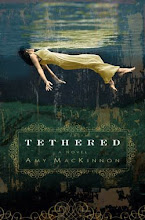When Jay Asher was in Las Vegas years ago, he took a self-guided tour with an audio cassette. That idea stuck in his mind though the story to accompany it was yet to come. It was during a winter drive on an ice coated road in Wyoming that the premise for his YA novel came.
In writing this book, Jay was trying something new. For twelve years he had written humor. He was ten pages in when he decided to enter the Society of Children’s Book Writer’s & Illustrators (SCBWI), Work-In-Progress grant. Luckily for Jay, they only requested ten pages!
Lisa Marnell: What were your concerns about writing a YA novel that deals with suicide?
Jay Asher: Having a
My Space page makes it so easy to be in touch with readers. I wondered what sort of stories I would hear, what feedback kids or adults would give me. I have heard from many people with all kinds of stories. Some kids have told me they were suicidal or knew people they now suspected might be suicidal. Others have highlighted specific passages that were meaningful to them. One teenager saw the signs and has since been diagnosed as depressed and is getting the help he needs.
LM: After many years of writing humor, what was your experience in writing a book that dealt with a character who had killed herself? How did you keep from getting depressed?
JA: There were times I would get so depressed since I knew what would happen to Hannah as I wrote her story. Before I got the idea for Thirteen Reasons Why, I thought, what’s fun about writing something that’s a downer? One thing that kept me going was the promise of writing one scene in particular which was necessary: the hot tub scene. I knew it would be such a writing challenge that I focused on that.
LM: From a writer’s perspective, what thoughts were foremost in your mind when writing this manuscript?
JA: Books I like have an element of suspense to them. As I worked on this novel, through both the planning and the writing, I really thought about that. I wanted to make the reader want to keep turning the pages.
LM: I read on your My Space page that you initially started writing Clay’s parts as well as Hannah’s parts, going back and forth between the two of them. After reviewing your work, you wrote Hannah’s story the full way through. Tell us more about your approach to writing Thirteen Reasons Why?
JA: For me, the writing experience involves a tremendous amount of brainstorming. The writing itself comes later for me, and can be difficult. Once I’m in the zone though, I find the writing can be exhilarating.
LM: Tell us something that’s unique about writing for teens.
JA: I’m fascinated with the way nothing is purely black and white for teenagers. Events in their lives are open for interpretation, there are different ways to connect the dots, different ways to see some things. As in Thirteen Reasons Why, gossip and rumors can be so prevalent in their day to day.
LM: As I mentioned, I read about the auction for your book on Publisher’s Marketplace. Can you tell us the details about how it happened?
JM: Well, the agent I have currently is my fourth agent as I had previous agents for the picture book manuscripts I wrote. Because I had won the SCBWI grant, editors more willing to read my novel, but it was rejected. Writing is art, and art is subjective. One editor wrote me a two page summary of everything he didn’t like about the book. Then, my agent very quickly got three offers, and three very different perspectives. I decided to go with the editor at Razorbill.
LM: Because we have a writer’s group blog, we are fascinated with your blog,
Disco Mermaids. It’s similar to ours, though I understand you all write for children/teens. Can you tell us a little about how your group and how it works?
JM: Robin, Eve and I used to be part of a larger writing group, but we all couldn’t meet at the same time. Since the three of us wrote the same type of fiction, we decided to form our own smaller group. I find the group is most important early on. Lots of brainstorming goes on in our sessions. We’ve been meeting every Tuesday lately.
LM: What’s next for you, Jay?
JM: My contract with Razorbill was a two book deal, so I’m busy working on something else which isn’t easy. Thirteen Reasons Why was life-changing.
Thirteen Reasons Why has won the following awards and acknowledgements:
Best Books for Young Adults (YALSA)
Quick Picks for Reluctant YA Readers (YALSA)
Selected Audiobooks for Young Adults (YALSA)
Borders Original Voices finalist
Barnes & Noble - Top 10 Best for Teens
Book Sense Pick - Winter
Chicago Public Library Best Books
Association of Booksellers for Children - Best Books
Since our interview, Jay told me he’s agreed to be on a panel at the SCBWI summer conference this year in Los Angeles. The panel includes children’s and YA authors who won SCBWI grants and continued on to publish.
Jay, we look forward to meeting you in LA!









 ...is my photo of Andy Roddick seconds before he threw his racket to the ground then tossed it into the crowd Saturday morning during practice. Ranked sixth in the world and coming off a win in Dubai, Andy was considered a favorite for doing well at the Pacific Life tennis tournament this weekend in Indian Wells, California.
...is my photo of Andy Roddick seconds before he threw his racket to the ground then tossed it into the crowd Saturday morning during practice. Ranked sixth in the world and coming off a win in Dubai, Andy was considered a favorite for doing well at the Pacific Life tennis tournament this weekend in Indian Wells, California.






